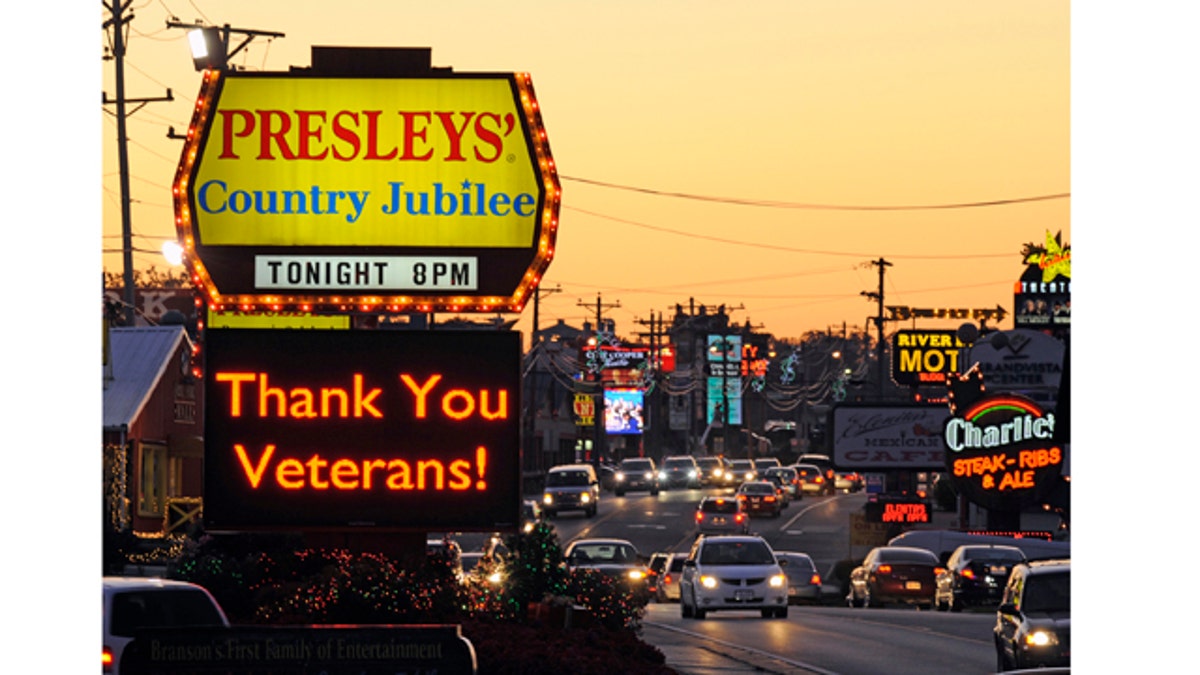
A music venue flashes an electronic marquee thanking military veterans in Branson, Missouri, November 9, 2011. The Midwestern entertainment-centered town in the Ozarks caters to veterans in the days leading up to Veteran's Day on November 11. Picture taken November 9, 2011. REUTERS/Dave Kaup (UNITED STATES - Tags: MILITARY SOCIETY ANNIVERSARY)
For more than a decade, members of the United States military have been charged with fighting not one, but two campaigns thousands of miles away from home. Life for the rest of American citizens, meanwhile, has largely gone unchanged.
This is a testament to the job our military members have done overseas to protect the quality of life we now take for granted. But while they have made it easy for us to follow business as usual, we owe it to them to reject that temptation.
Military members today are not akin to wars past, fought largely by young men who served their tour of duty and were free to return home upon it’s completion. Today, fathers and mothers have been asked to leave their families several times over, with only a few months of time at home before heading back to pick up where others left off.
Their kids begin to resemble foster children as they are shuttled around to grandparents, aunts and uncles, siblings or neighbors while their parents are away. If separation from family were their biggest concern, it would be challenging enough; however, the constant horrors of combat overshadow it so extensively, most of us forget the ever-present familial tensions.
Fighting wars in Iraq and Afghanistan has required the service of not only our active duty military, but several deployments of reserves and National Guard personnel. These individuals were taken from their jobs, served in a war zone, and immediately dropped back into American society with very little support to acclimate them to a normal routine.
Some might assume that switching concerns from IEDs, snipers and suicide bombers back to getting to work on time, transporting kids and paying the bills would be a welcomed one. But although it can be a relief, the shock can be overwhelming.
For too long our military members have been asked to foot the bill for these wars entirely on their own. We owe it not only to ensure short-term help for our returning heroes, but for long-term aide as well.
Nearly forty years ago, Saint Leo University became the first college ever to award a bachelors degree to active military members on an Air Force base. It seems fitting that this distinction would come in 1973, at the apex of one of America’s most unpopular wars. Colleges and universities across the country played host to countless demonstrations and protests.
But Saint Leo recognized that the military members were not to blame for an unpopular war. When asked to go to military bases to offer classes for serving members, we went and we are still there today to help provide our members with a long-term track of success when their service is complete.
Sustaining support for the Post 9/11 G.I. Bill is vital, as is adequate funding for Veterans Affairs hospitals. But the burden of support does not lie solely in the hands of our government.
Unemployment rates among our veterans are shamefully high. Employers in the private sector must make it a priority to hire vets and provide whatever employee assistance programs necessary to help them reenter normal society.
These veterans are not seeking a hand out, nor would many of them accept one if presented to them. Many military students I see at Saint Leo juggle a full time job, raise a family and choose to devote the little additional free time they have to take classes and pursue further education. They are not only preparing themselves to advance in their military careers but also for post-military employment. In the process, they set a tremendous example for everyone around them.
Military members are resilient. They’ve been given leadership training. They know how to be a team member. They have a clear understanding of knowing the mission and how to achieve objectives, and have many times over demonstrated courage and skill under high-pressure situations.
These are all skill sets that will make them effective in the workplace, especially when partnered with a degree in their field. Putting that package together in the workplace and in the community is a powerful dynamic. They have already made a tremendous contribution to our society through their military service, but their potential for greatness at home too often goes untapped.
Americans are really good at putting yellow ribbons on our bumpers, waving flags and chanting “USA! USA!” But beyond that superficial shell, we have not done enough. I don’t know that we could ever adequately repay them for their sacrifice, but far too often, it seems that we’re not even willing to try.







































